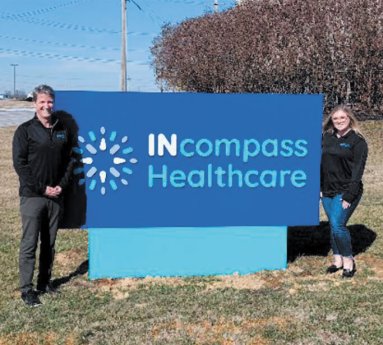INcompass: Formerly CMHC – better identifies services

HarleyJo Kennedy Photo
Pictured left is Greg Duncan, right, Nicole Kinney. Not pictured Kiersten Libby, is the administrative assistant to CEO, Lawrenceburg.
All 24 Community Mental Health Centers in Indiana will be rebranding to: INcompass Primary Care or INcompass Healthcare. Greg Duncan, President/CEO of INcompass Lawrenceburg (L’burg), and Nicole Kinney, Marketing and Communications Relations Specialist (Lawrenceburg) addressed the rebranding and future of INcompass Healthcare Facilities.
The concern was the stigmatization of mental healthcare. Often people in need will not seek assistance from a facility branded “mental health” because of the stigma attached to mental health needs and treatment.
“INcompass provides cradle to grave healthcare,” states Duncan. Many services previously provided have been enhanced. Kinney describes some of the programs offered for families. Family Preservation and Early Connections are two mentioned.
These two programs cover pre-natal, post-natal, and early years development. Also included in all programs are referrals to resources that are needed and go beyond the services offered at INcompass Health.
Kinney states, “If we can’t give you the care – we help you find it.”
INcompass is a brand/logo developed in close association with the healthcare team and marketing. The need for a name change, discussion, began in 2021. 2022 saw the discussion firm up the scope of services to be offered. 2023 was when the marketing department ramped up their efforts to formalize the name and functions of the newly rebranded healthcare product.
In early 2023, it was decided. This is a southeastern Indiana facility/organization. It also serves Northern KY and some of OH. “IN” would be part of the name and is where the entity/organization resides. March 2024 will host a ribbon-cutting to officially open the facility under it’s new design and name.
Further, the direction and journey of encountering healthcare is often a scary and unknown territory. A “compass” provides direction along with the healthcare team and advocates encountered. Thus, the name “INcompass” was designed.
At this time, INcompass covers five counties: Dearborn, Franklin, Ohio, Ripley, and Switzerland. There are also INcompass programs in Jefferson and Decatur Counties.
Duncan cheerily remarks, “CMHC just doesn’t encompass what we offer the community.”
More services offered:
A Mobil Crisis Team, which does not necessarily go to a scene, but can relieve law enforcement in an Emergency Department (ED) or other acute care setting.
A person experiencing a mental health crisis may be receiving physical treatment for injuries or self-harm but need further care for the mental crisis.
The Crisis Care Center will open in mid-April. It will provide assistance to adults, adolescents, and children. It provides a place to shower, do laundry, and re-group and gain perspective on upcoming and necessary assistance needed.
A 16-bed facility for adults experiencing mental health emergencies. This would be a 23 hour or less stay. According to Kinney, INcompass L’burg provides “a really welcoming environment where YOU are the one in charge of your care.”
The Unity House – a 12-bed unit for dually diagnosed individuals. This could provide a six to nine month stay. It entails co-occurring diagnoses that complicate treatment and recovery. They can be any combination of mental health issue, addiction, and/or legal issues.
Care at the Unity House, will consist of case management, intensive psychotherapy, behavioral counseling, and address physical health issues. Other services such as, job coaching, building a resume, or other life skills needed for success upon discharge are also provided.
While many accommodations described are mental health services, the entire person is treated. Many programs offered are not mental health “related.” But since covid, more practitioners are realizing many physical diagnoses are also mental health related issues and/or many people have unaddressed mental health needs.
INcompass seeks to de-stigmatize seeking mental health care! Duncan emphasizes, “People affected by mental health issues are your folks, your parents, your friends, any- and everyone in the community.”
Duncan provides statistics: “Seriously mentally ill persons die 25 years before others.”
Duncan insists, “Physical, behavioral, mental care must be located in one facility to coordinate care.” Duncan suggests in this way, all treating practitioners can coordinate care for the entire person, not just one aspect of care.

